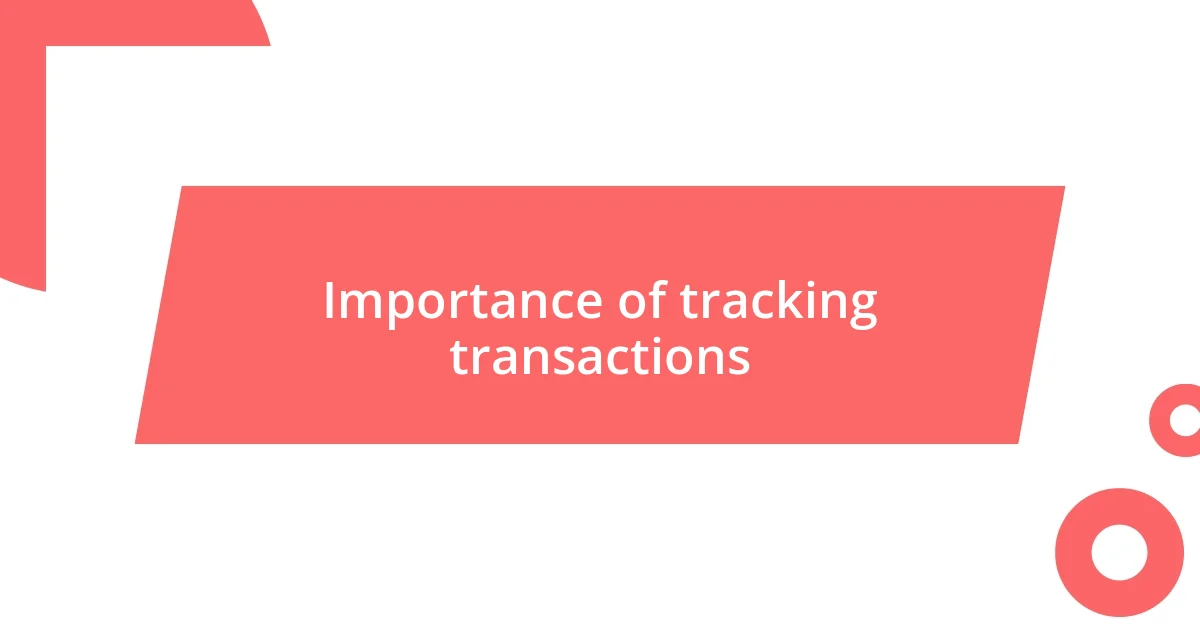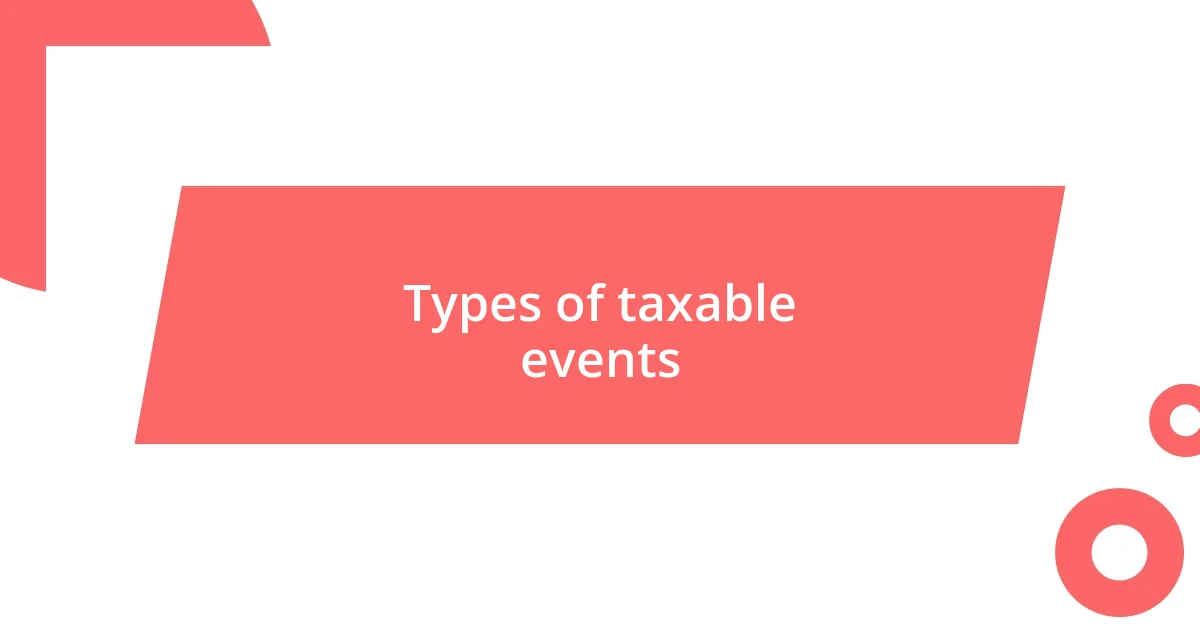Key takeaways:
- Cryptocurrencies are considered property by the IRS, leading to capital gains tax on profits from sales or exchanges.
- Maintaining detailed records of every transaction is essential to avoid unexpected tax obligations and penalties.
- Opportunities exist for tax deductions (e.g., transaction fees) and strategic moves like tax-loss harvesting can mitigate tax burdens.

Understanding crypto taxation basics
When it comes to crypto taxation, the first thing to grasp is that cryptocurrencies are generally treated as property, not currency, by the IRS. This distinction can be quite eye-opening; for instance, when I first sold some Bitcoin, I was caught off guard by how any profit would be classified as a capital gain. Have you ever navigated tax implications without realizing the full scope? It can feel overwhelming, but understanding this is crucial.
I remember a time when I was frantically researching to understand how my crypto trades would impact my taxes at the end of the year. The realization that every time I exchanged one cryptocurrency for another, or even used some for purchases, I might incur a taxable event was a lot to digest. Did you know that even small transactions can add up? That’s why keeping meticulous records of every transaction is so important; I learned this the hard way, and trust me, it’s worth the effort.
Another fundamental aspect to consider is the difference between short-term and long-term capital gains. This differentiation can significantly influence how much tax you owe. If you hold your crypto assets for over a year, you might qualify for lower long-term tax rates—how great would that be? Reflecting on my own investments, I’ve found that a little patience can go a long way in minimizing tax burdens. Have you considered your holding strategy in light of these tax implications? It can make all the difference!

Importance of tracking transactions
Tracking transactions in the world of cryptocurrency is not simply a good practice; it’s essential for compliance with tax regulations. From my experience, every buy, sell, or trade contributes to your taxable income. I recall a fellow investor who faced penalties due to inadequate record-keeping; the stress of dealing with an audit was a nightmare that could have been avoided with better tracking.
I’ve learned that the complexity of crypto transactions can lead to unexpected tax obligations. For instance, when I used my Bitcoin to make a small purchase for a gadget, I didn’t realize that this constituted a transaction that needed reporting. It felt frustrating at the time, but now I see how meticulous tracking transformed my ability to manage those obligations efficiently. Have you ever considered how every little detail contributes to your tax picture?
The importance of documenting these transactions thoroughly cannot be overstated. By consistently logging your trades, you equip yourself with the knowledge to accurately report to the tax authorities. In my case, keeping a well-organized ledger helped me avoid making costly mistakes and gave me peace of mind during tax season. It’s a practice that can save you time, money, and a whole lot of headache.
| Transaction Type | Tax Implication |
|---|---|
| Buying Cryptocurrency | No taxable event |
| Selling Cryptocurrency for Profit | Capital gains tax applies |
| Using Cryptocurrency for Purchases | Potential taxable event |
| Exchanging one cryptocurrency for another | Taxable event |

Types of taxable events
Understanding the types of taxable events in cryptocurrency can save you from unexpected surprises at tax time. I’ve encountered a few eye-opening situations myself. For example, I remember when I thought exchanging Ethereum for Litecoin would be a simple swap, no money involved. Boy, was I mistaken! Each exchange is treated as a taxable event, meaning I had to track gains or losses for each transaction, which can really add an extra layer of stress if you’re unprepared.
Here are some common types of taxable events in the crypto world that you should be aware of:
- Selling Cryptocurrency for Profit: This triggers capital gains tax and is the most straightforward taxable event.
- Exchanging One Cryptocurrency for Another: Even though you aren’t cashing out to fiat currency, the IRS treats this as a taxable event based on the value at the time of exchange.
- Using Cryptocurrency for Purchases: When you use crypto to buy goods or services, the IRS considers it a sale, often resulting in taxable gains.
- Mining Cryptocurrency: If you mine crypto, any coins you earn are considered income, subject to tax based on fair market value.
- Receiving Cryptocurrency as Payment: Payments received in crypto for services are treated as ordinary income and taxed accordingly.
After realizing the breadth of taxable events, I began to appreciate the importance of meticulous record-keeping. Each instance, big or small, can lead to tax ramifications, and the last thing I want is a surprise bill that I didn’t see coming. So, while it feels overwhelming at times, being informed can help simplify the process and keep you compliant.

Deductions and credits for crypto
I’ve learned that while taxation on cryptocurrency can feel intimidating, there are potential deductions and credits that can lighten the load. For instance, when I realized I could deduct fees from cryptocurrency exchanges, it was like discovering hidden treasure! It’s crucial to keep track of those transaction fees because they can add up and significantly impact your taxable gains.
One aspect I often think about is the treatment of losses when it comes to crypto investments. I remember when one of my investments tanked and I ended up with a hefty loss. A friend of mine encouraged me to look into tax-loss harvesting. Essentially, selling off underperforming assets can help offset gains elsewhere. It made me realize that sometimes making a strategic move, even if it feels painful at the moment, can lead to better financial outcomes in the long run. Have you ever experienced mounting losses and wondered how to make the most of a difficult situation?
Also, don’t overlook the potential for claiming a credit on your taxes if you’ve contributed to charity using cryptocurrency. I had this experience when I donated a portion of my crypto holdings in a charity event. Not only did it feel fulfilling to give back, but I also learned that such donations could be deducted as a charitable contribution, just like cash donations. It’s a win-win situation that encourages philanthropy while also keeping the taxman at bay!

Common mistakes to avoid
It’s easy to overlook important details when handling crypto taxes, and one common mistake I see—and have made—is failing to keep detailed records. I remember a time when I didn’t track my trades meticulously, thinking I could sort it out later. It felt like I was gambling with my financial future! Trust me, the chaos of untangling those trades during tax season is not worth the stress.
Another pitfall is underestimating the complexity of exchanging different cryptocurrencies. When I first started out, I assumed swapping Bitcoin for some lesser-known altcoin was harmless. But each exchange can carry substantial tax implications. I learned the hard way that treating these trades as simple transactions could lead to tax headaches later. Are you ready for that?
Lastly, many folks forget about the tax consequences of staking rewards. I used to think that the tokens I earned just for holding on to my investment were bonus points, but they are treated as income, subject to tax. That realization hit me during tax time, adding an unexpected twist to my financial strategy. Remember, being proactive about understanding these nuances can save you from those unwelcome surprises down the line.

Resources for crypto tax guidance
When diving into crypto tax guidance, I found that online tax software tailored specifically for crypto transactions made a world of difference. I remember the first time I used such software—everything became streamlined, and the anxiety of calculating my taxes seemed to melt away. Have you ever felt that moment of clarity when the right tool makes a complicated task so much easier?
If you’re seeking expert opinions, joining online forums and communities can be incredibly enriching. I often browse Reddit and Telegram channels where discussions about crypto taxation abound. There’s something empowering about exchanging experiences with fellow investors; learning from their successes and mistakes adds layers to my understanding of tax implications.
Additionally, considering hiring a tax professional with crypto expertise has proved to be invaluable for me. Just the other day, I consulted with an expert who navigated the nuances of IRS guidelines with ease, point by point. The comfort of knowing that I’m on the right path, especially when complexities arise, gives me peace of mind during filing season.














